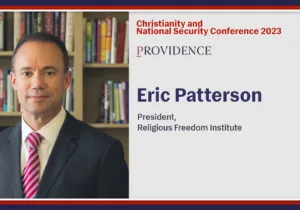At this past November’s American Academy of Religion conference, I sat in the Niebuhr Working Group meeting while the president of that society bemoaned, “Niebuhr has fallen upon hard times. I scanned this year’s program book, and apart from this meeting’s offerings, only one paper on Niebuhr is being presented at this conference.” I was the author of that one additional paper, on Niebuhr’s theology of religious freedom. Unbeknownst to the president of the Niebuhr society, my research had left me unpersuaded by Niebuhr’s arguments, and therefore the one paper on Niebuhr this year was a relatively hostile one—I presented, as I said at that conference, “the Clark Kent version of Niebuhr, rather than the Superman version.” This is a rather precipitous fall for one who was once heralded as the favorite theologian of Obama. So where have the Niebuhrians gone?
A common explanation for his decline is that Niebuhr has come to be associated with Neoconservatism in general, and the Global War on Terrorism in particular. Therefore, his legacy is tied up with the success of those wars—though ironically, it is not clear whether he would have supported them, given his claim that “a democracy cannot, of course, engage in an explicit preventive war. But military leadership can heighten crises to the point where war becomes unavoidable” (Irony of American History, 146). The Niebuhr of the popular imagination was the Neoconservative Niebuhr, the Niebuhr of the Second Gulf War, and his reputation is pegged to the reputation of that war.
But there is, perhaps, a deeper reason for his decline, and it is that reason I want to investigate here. In beginning to answer that question, I have to tell a story. Among the many Google Alerts I have set up to keep me updated on topics of interest across the internet, the alert for “Alexis de Tocqueville” is unique for its daily hits being entirely predictable. Typically, it is a small-town American newspaper, which has recently published an op-ed full of hand-wringing about the future of the country, which finally circles around to one of Tocqueville’s most famous quotations:
I sought for the greatness and genius of America in her commodious harbors and her ample rivers—and it was not there…in her fertile fields and bound less forests—and it was not there…in her rich mines and her vast world commerce—and it was not there…in her democratic Congress and her matchless Constitution—and it was not there. Not until I went into the churches of America and heard her pulpits flame with righteousness did I understand the secret of her genius and power. America is great because she is good, and if America ever ceases to be good, she will cease to be great.
By my anecdotal estimates, this quotation constitutes at least half of the new mentions of Tocqueville that my Google Alert picks up each week. That is a stunning percentage of popularity to be given to a quotation that Tocqueville never wrote. While it is fascinating in itself that Tocqueville’s most popular quotation is one that he never said, what is more illuminating here is what that quote represents: the famed American alliance between interests and values, an alliance which Tocqueville does discuss under the phrase of “enlightened self-interest.” The frequency of that citation to Tocqueville is just one piece of anecdotal evidence to suggest what most Americans feel somehow intuitively: that it is not too far to say that this union between American interests and values once perhaps did exist, but it seems that union is dissolving into divorce. As in the wake of any messy divorce, those who have been the friends of that union are now forced to pick sides between the newly-estranged parties. Some will take sides with the idealists and insist that concerns for realist interests constitute moral contagion. Others will take sides with the realists and insist that values are distractions from the hard business of asserting the national interest.
This divorce constitutes the particular, American version of a broader shift in political theory more generally, which is the rise—from both the left and the right—of the skepticism of the goodness and greatness of the liberal order, and this brings us back to Niebuhr. Niebuhr is the son of the marriage between Christianity and liberalism, but as that marriage has entered into divorce proceedings, neither parent seems keen to claim custody of their son. Perhaps Niebuhr has fallen out of favor because the easy alliance he is commonly tempted to see between Christianity and democracy (endorsed only pessimistically, of course) is increasingly called into question. On the other hand, in the circles in which belief in this fusion still exists, Niebuhr’s lifelong socialism makes him unpalatable to the right, and his insistence upon Christianity as crucial to making sense of that fusion is unpalatable to much of the left. Stated more precisely, Niebuhr’s endorsement of democracy is too theologically-inflected for the palette of Rawls’ post-Christian children, and his theology is too infected with democracy for post-liberal Christians who have begun to recognize that the presuppositions of democracy may not be as at home in the history of Christianity as we may once have suspected.
Because Providence is a magazine concerned with Christianity and foreign policy, with Niebuhr as its Patron Saint, it is worth lingering a bit longer with that second point above. Reading Niebuhr as a faithful Christian theologian is difficult in several instances. Take, for example, his fallibilist endorsement of freedom of religion (cf. the chapter on “Democratic Toleration and the Groups of the Community” in Children of Light and Children of Darkness), according to which the Christian rationale for supporting freedom of religion is the fact that we might be mistaken about our own religious convictions, so we ought to entertain the opinions of other religions in case they are correct. Niebuhr calls this “religious humility,” which is actually an endorsement of some kind of skepticism about one’s own religious convictions. And again his theology is infected by democracy at the crucial point of hope, which he often touts (and where Obama’s indebtedness to him is perhaps most obvious), which turns out not actually to be an infused virtue, but something much closer to liberal optimism.
Secondly, he is troubling to orthodox Christian theologians because of his adoption of that consequentialist reasoning which is Niebuhr’s inheritance from the American Pragmatists, but which is, however, alien to the mainstream of Christian ethical reflection. Take, for example, the preface to The Irony of American History, where he defines the tragedy which marks American foreign policy:
The tragic element in a human situation is constituted of conscious choices of evil for the sake of good. If men or nations do evil in a good cause; if they cover themselves with guilt in order to fulfill some high responsibility; or if they sacrifice some high value for the sake of a higher or equal one, they make a tragic choice. Thus the necessity of using the threat of atomic destruction as an instrument for the preservation of peace is a tragic element in our contemporary situation. Tragedy elicits admiration as well as pity because it comes nobility with guilt. (Niebuhr 1952:xxiii)
Here Niebuhr innovates on the history of Just War reasoning by explicitly adopting a consequentialist ethic which earlier theorists of Just War were keen to reject. At times Niebuhr will refer euphemistically to the need to take “morally hazardous actions to preserve our civilization” (Niebuhr 1952:5). But the disjunction here with Augustine is profound; Augustine’s frequently overlooked first half of City of God consists primarily in the argument that Rome was corrupt because it was morally corrupted, and therefore, it is not much of an exaggeration to say that Niebuhr’s willingness to “do evil that good may come,” in Plato’s terms, or in Paul’s terms, “to continue in sin that grace may abound,” actually constitutes a significant departure from Augustine.
This departure from Augustine on the critical question of whether Christians ought to adopt consequentialism in our foreign policy is of more than merely academic interest. Take, for example, recent Christian treatments of the war in Yemen. Recent Providence writers have defended the US support of Saudi Arabia’s war in Yemen as a proxy to check Iran. The realist logic of Tooley’s argument is clear, but the Just War logic is far opaquer. If it is true, as numerous reports indicate, that the famine striking Yemen is manmade and consequently has led to the deaths of over 85,000 children, who are by definition noncombatants, then it is clear that the Just War principle of non-combatant immunity is being violated, and not incidentally—as collateral damage—but as an intended disregard for the principle of discrimination. Gestures toward “morally hazardous actions” or “nuanced understandings of state geopolitical duties” that cannot deal frankly with the chain of reasoning provided by the classical Christian Just War criteria devolve into euphemisms obscuring what can be stated more simply: Christians ought to recognize that evil must be done in order for a greater good to be achieved, and that sin must continue so that grace can abound. Any US support for a war in which famine is weaponized against a civilian population renders the US accessory to an unjust war.
Niebuhr may find this tradeoff worthwhile, but Augustine would not, nor would the mainstream of Christian ethical reflection that denies this kind of consequentialism. As young Christians continue to rediscover this historical ethical tradition, their affinity for Niebuhr is likely to continue to abate. It is to be eagerly hoped that America may yet still become both good and great, but it may require some genius other than Niebuhr to arrange the reconciliation of that recent divorce.
—
Photo Credit: Reinhold Niebuhr, Union Theological Seminary Archives.





